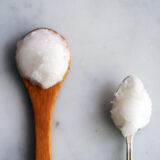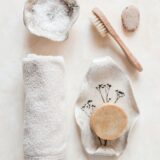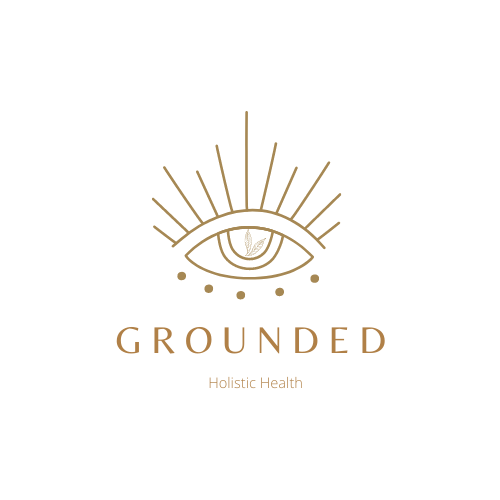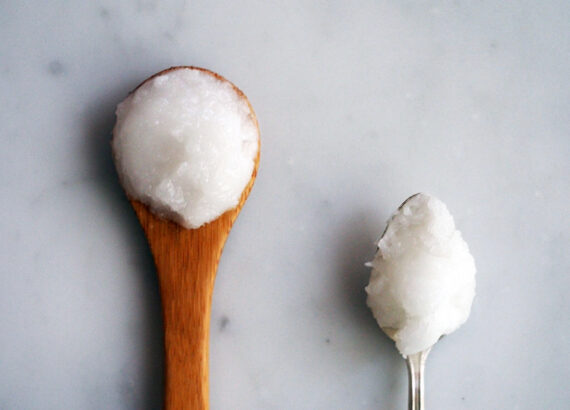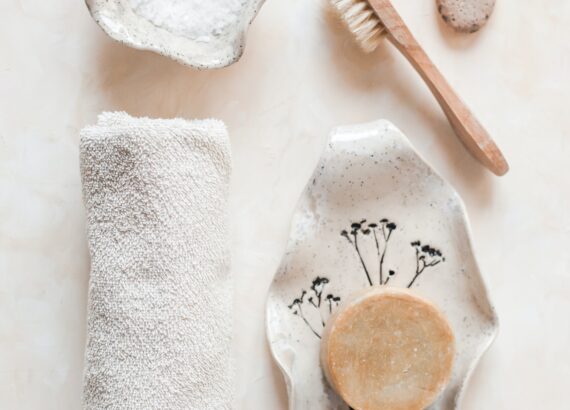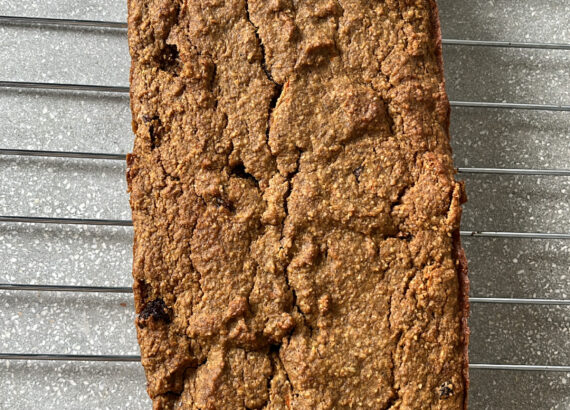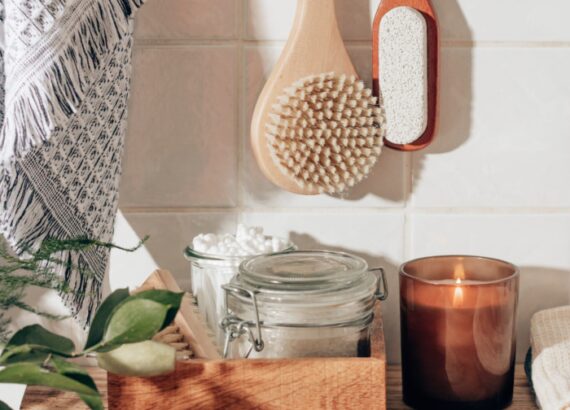Oil Pulling Benefits + How to Oil Pull for Detoxification
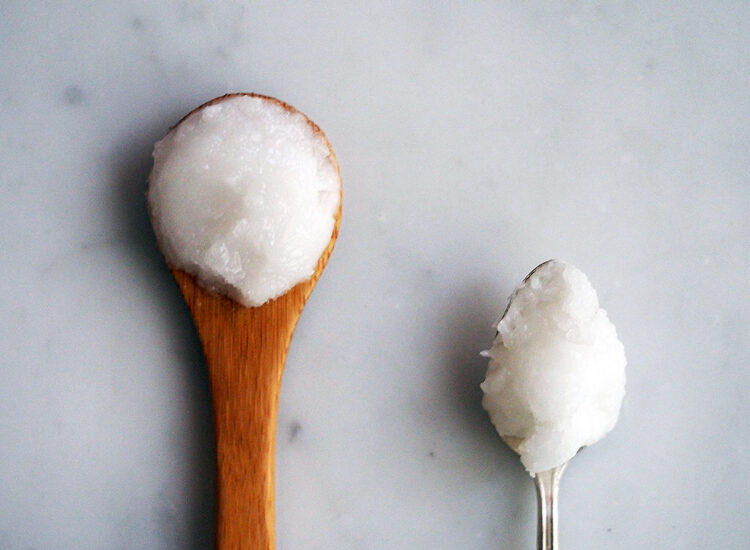
"As simple as it is, oil pulling has a very powerful detoxifying effect. Our mouths are the home to billions of bacteria, viruses, fungi and other parasites and their toxins. Candida and Streptococcus are common residents in our mouths. It is these types of germs and their toxic waste products that cause gum disease and tooth decay and contribute to many other health problems including arthritis and heart disease. Our immune system is constantly fighting these troublemakers. If our immune system becomes overloaded or burdened by excessive stress, poor diet, environmental toxins and such, these organisms can spread throughout the body causing secondary infections and chronic inflammation, leading to any number of health problems.”
- Bruce Fife, ND - Oil Pulling Therapy: Detoxifying & Healing the Body Through Oral Cleansing.
What is oil pulling?
Oil pulling is an ancient Indian practice that involves cleansing your mouth with oil. In Ayurvedic texts, oil pulling is known as kevala or gundusha. It offers numerous health benefits, including enhancing oral flora, preventing tooth decay, alleviating bad breath, and fortifying the tissues of the teeth and gums.
You might have heard of oil pulling, but aren’t sure what it really means or how it works. Maybe, you’re questioning the actual benefits of putting oil in your mouth. If that’s the case, you’re in the right place to explore oil pulling and the facts supporting its effectiveness.
Oil pulling is the act of taking a small amount of oil and swishing it around in your gums and teeth for around 10-20 minutes. This promotes detoxification of the body and cleaning of teeth and gums. It involves holding a comfortable amount of sesame or coconut oil in the mouth, gargling it or pulling it through the teeth, and around the tongue and gums.
How does oil pulling support detoxification and immunity?
In both conventional medicine and Ayurveda, the tongue serves as a crucial diagnostic tool, highlighting the interconnectedness of oral health and overall well-being. Supporting oral hygiene, therefore, contributes to general health.
The oral cavity is an important component of our innate immunity – the frontline defense against microbes present in the nose, mouth, throat, gastrointestinal tract, and urogenital tract linings. Functioning as a sturdy barrier, the oral cavity acts like an immune firewall, preventing viruses or bacteria from entering the body further.
The mouth also hosts over 600 different microbial species, living in our teeth, tongue, cheek, palate tissues and tonsils. The oral cavity is closely connected to the esophagus, nasal passages, sinuses and ear cavities. The importance of bacteria in the mouth is evident given its proximity to all of these areas.
While many bacteria are essential for a healthy oral microbiome, some like Streptococcus mutans and Candida, can lead to issues such as tooth decay, bad breath, gingivitis, and even arthritis and heart disease.
How it actually works
Bacteria are single-cell organisms wrapped up by a lipid (fat) membrane, and thus are naturally drawn to the lipid structure of oil.
During oil pulling, these bacteria adhere to the oil’s fat molecules, and then are subsequently removed as the oil is swished around and then expelled. Oil pulling is a long known method not only supported by Ayurvedic practitioners but also by doctors, scientists and dentists for improving oral hygiene.
Health benefits of oil pulling
Improves Teeth and Gums
A thriving oral microbiome has a significant impact on the health of your teeth and gums. Among the bacteria residing in the oral cavity, Streptococcus mutans (S. mutans) is a major contributor to tooth decay. It is also linked to secondary infections in the kidneys, lymph and skin. In a comparative study, one group engaged in sesame oil pulling, while another used an antiseptic (chlorhexidine) mouthwash. The study assessed the Streptococcus mutans (S. mutans) count after ten minutes of swishing over a two-week period. The results revealed a notable reduction in the S. mutans, count after both 1 and 2 weeks of oil pulling, mirroring the outcomes of the chlorhexidine group.
Additionally, oil pulling removes plaque better than toothpaste and alcohol based mouthwash, repairs bleeding gums, improves bad breath and prevents post-dental surgery infections.
Balances Bacteria and Protects the Heart
Oil pulling creates a perfect balance between good and bad bacteria, as opposed to alcoholic mouthwashes which wipe out your flora completely.
There are multiple studies associating bad oral health to poor heart health. Oil pulling is key to keeping unfriendly bacteria like P. gingivalis at bay — which is associated with cardiovascular disease.
Conversely, high counts of commensal (friendly) bacteria support the conversion of nitrites in fruits/vegetables to nitric oxide (NO) — a powerful gas that acts as a blood vasodilator. Adequate NO helps to lower blood pressure, cholesterol and reduces the risk against dementia, diabetes and metabolic disorder.
Oil pulling helps to support a healthy bacterial balance in the mouth and NO production. Whereas commercial mouthwashes reduce and disturb commensal bacteria in the mouth, preventing the conversion of nitrites into NO. By protecting oral bacteria, oil pulling helps to reduce the risk of arterial plaque build up and hypertension — 2 important contributors to heart disease.
Practicing oil pulling and tongue scraping can be a simple and effective way to support the body’s detoxification process and support the cardiovascular system.
Supports Sinuses
Although clinical studies on this topic are scarce, considering Ayurveda is thousands of years old, clinical experience is sufficient. Studies suggests that oil pulling sustains healthy bacteria in the mouth could impact adjacent tissues. Additionally, advocates claim that oil pulling enhances circulation in the oral tissues, potentially delivering nutrients and lymph to the sinus tissue as well. This means using oil pulling during a cough or the flu will speed up recovery, as it pulls the bad bacteria.
Relieves constipation and reduces water retention and allergies!
This is remarkably intriguing. Research indicates that engaging in oil pulling for six weeks led to a substantial decrease in constipation. Moreover, studies have demonstrated that after only 45 days of practicing oil pulling among a group of 100 elderly individuals, there was a significant reduction in constipation (30%), allergies (49%), arthritis (9.48%), and water retention (11.5%).
How to oil pull?
Method:
- Start by scooping 1 tablespoon of coconut or sesame oil in your mouth.
- Swish the oil in the mouth, pulling it around both sides, and in front of, behind, and through the teeth.
- Do this for 15–20 minutes, until the oil has become thin, fluid and more white. You can work up to this time frame, but start with 5 minutes minimum for optimal results. A practical way is adding it to your morning routine while showering and getting ready.
- When you’re done, spit out the oil in the trash or toilet, or in the garden, rather than down the drain, to avoid clogging the drain. Do not swallow the oil.
- Rinse the mouth with warm water.
- Brush your teeth as usual. I use Natural Toothpaste made with Hydroxyappatite – an active compound that is just as effective as fluoride at reducing plaque, and is completely non-toxic. Plus hydroxyappatite based Natural Toothpaste is especially good for the health of our body in general. It remineralised the enamel, i.e. replenishing your teeth with minerals. I avoid fluoride as it interferes with thyroid function and can increase heavy metal load in the body, stripping minerals such as magnesium, zinc and calcium.
Best oil for oil pulling:
Traditionally, sesame oil was used for oil pulling, but Organic Coconut Oil has become increasingly popular due to its recognized antibacterial properties. Personally, I am a fan of using Organic Coconut Oil not only for its delightful taste but also for its versatility. It serves multiple purposes in my routine, such as oil pulling, moisturizing my face and body, cooking, hair care, and even as a tanning agent. I specifically opt for this particular Organic Coconut Oil because of its exceptional quality, and the size-to-price ratio makes it the most affordable option for me. Try to use organic cold-pressed oils where possible.
Give it a Try!
Let me know in the comments what your experience is with oil pulling and/or if you have any great natural oral hygiene tips!
Sources:
Oral Health: A Window to Your Overall Health.” Mayo Clinic. November 01, 2018. Accessed April 19, 2019.
Singh. “Tooth Brushing, Oil Pulling and Tissue Regeneration: A Review of Holistic Approaches to Oral Health.”
Solutions for Sinusitis.” Help for Sinusitus | DrDeborahMD.com. Accessed April 19, 2019.
D. Kavitha . Effect of Oil Pulling to Relieve the Constipation among Adolescent Girls in Womens Hostel, Coimbatore. Int. J. Nur. Edu. and Research. 2016; 4(4): 401-405.
